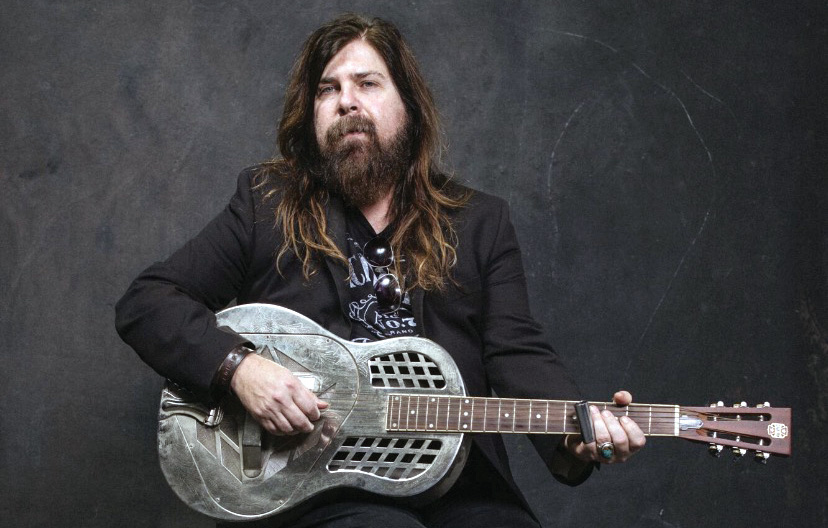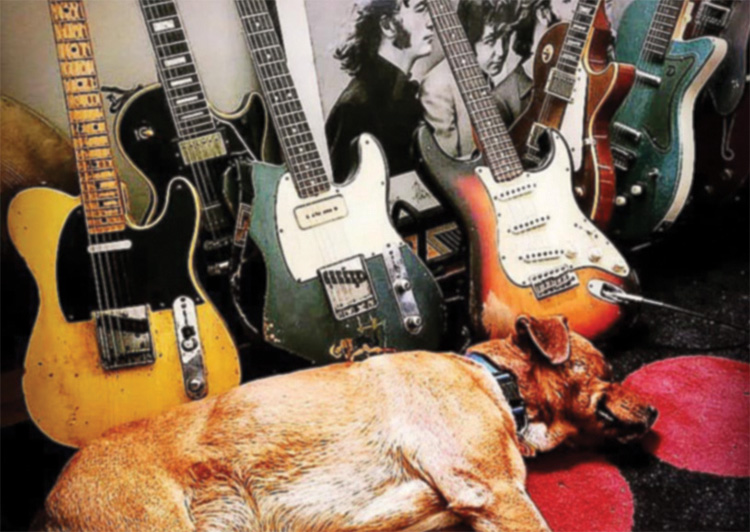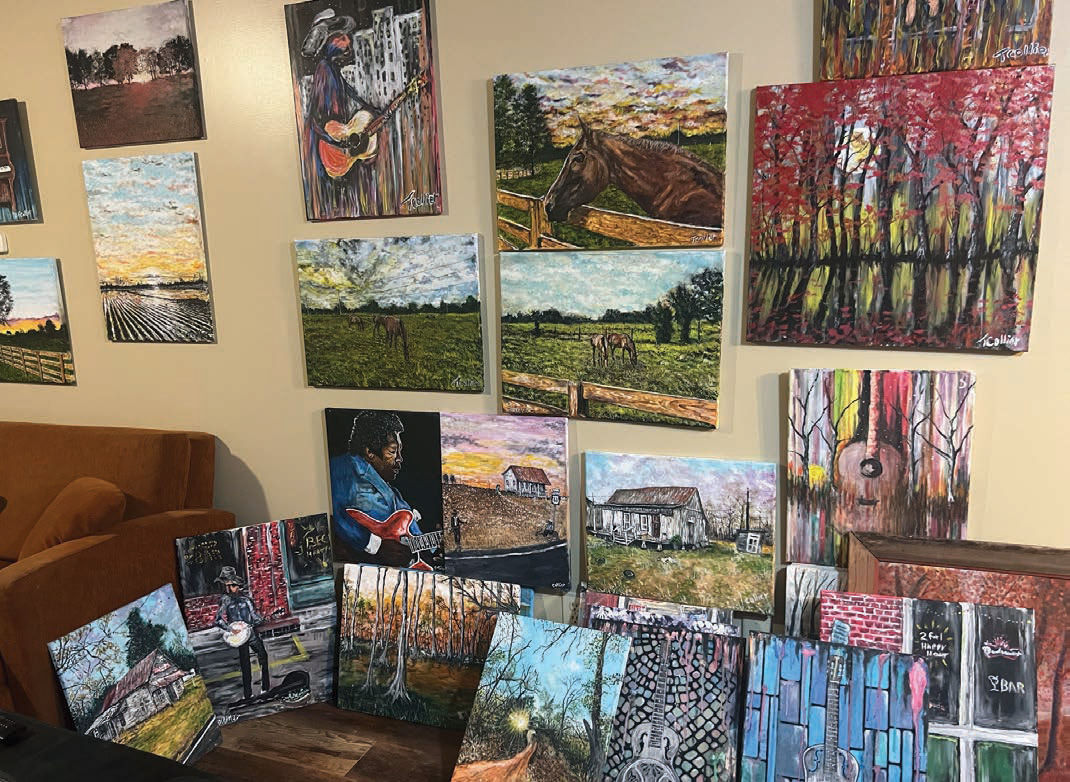By JIM BEAUGEZ
Tommy Collier shares a name with his late father, who was a respected artist in Greenville. But he’s a creative force in his own right.

As a musician living in and around Nashville, Greenville native Tommy Collier has found himself in many unexpected situations, with plenty of valleys to accentuate the peaks in his career. But lately, even that has taken a sharp turn.
It all began two years ago, when Collier lost his mother and sister within a year, following his father’s death in 2008. After he returned to Greenville to close his parents’ estate, he came across a cache of prints and paintings left by his father, Thomas Collier, who rendered scenes from the Delta and abroad with an impressionist’s hand.
He brought what remained of his father’s artistic legacy back with him to Nashville and had it appraised. “I started selling his prints, and people were buying them like crazy,” Collier says. “And so I got inspired to start painting again.”
As a kid, Collier would watch while his father turned blank canvases into colorful works of art, and in first grade, he won his first statewide art competition for a picture he drew of an underwater diver. More awards would follow, but in the meantime, he discovered the Beatles and rock ‘n’ roll.
“I remember running through the house, and seeing Help, the Beatles movie, playing on the TV,” he says. “I had this little toy gun and I can remember just falling on my knees and dropping the gun and looking at this.”
That’s all it took. Collier threw himself into learning the guitar, and as a teenager even got some pointers on slide guitar from blues legend James “Son” Thomas, who happened to walk into the music store where he was working. He earned a scholarship to Delta State University, where he studied classical guitar, but dropped out to play music in a band—first with Steve Azar, and then with a modern rock band he formed and took to Nashville.

Although the band showcased for a number of record labels, they all wanted to change the band’s look and sound to fit in with the current music scene. Collier began to get publishing offers because he was the band’s main songwriter, and the band slowly dissolved after he signed a deal. Among his early collaborators as a full-time songwriter was Katy Hudson, a teenage singer-songwriter who was working on a contemporary Christian album. The record label folded during the rollout, causing her album to quickly fade, but Hudson would soon reinvent herself as Katy Perry.
“She was signed to Red Hill Records, and she was like 16 or 17 years old,” he recalls of his time working with the future pop icon. “She knew, like, three chords on the guitar, so I started showing her a bunch of chords and teaching her Beatles tunes. We started writing some stuff, and I ended up producing a couple of tracks on her record.”
Collier played some shows with Hudson before her career arc shifted. But by then, he was an in-demand session guitar player, playing on demo and tracking sessions for Christian, country, and Americana artists. One musician he connected with was Ashley McBryde, an Arkansas native who had moved to Nashville like Collier and scores of hopeful songwriters and musicians. The pair clicked, and he joined her band on lead guitar, eventually earning a Grammy award nomination for Best Country Album for his songwriting on McBryde’s 2018 album, Girl Going Nowhere.
Before the Covid pandemic hit in 2020, Collier turned down an opportunity to join her band full time. The timing simply wasn’t right. “I was touring with her for a couple years, and at that time I was slowly getting songs together for my own thing,” he says. “And when it came time to make the big commitment, I really wanted to work on my own record.”

Collier came full circle with his music career, performing and producing his own music once again for an album that will come out later this year. But it happened in concert with his reentry into painting after twenty years, as well. As he eased back into his art, he went to his original source of inspiration—the Delta—and created works depicting cypress trees at Leroy Percy State Park near Hollandale, as well as the swamps, shotgun shacks, and sunsets he knew growing up.
His new artwork sold fast, and he rededicated himself to the discipline, building collections of Delta scenes, horses in pastoral settings, and Nashville landmarks like the Bluebird Cafe and Ryman Auditorium. His music series includes paintings of B.B. King and the primary instruments of blues music—electric, acoustic and resonator guitars.
“I’ve had people all over the country order, from California to Washington to Florida,” he says. “A lot of people who have lived in the Delta but moved off have reached out because it takes them home.”
But the truth is that Collier is equally indebted to both muses; one often inspires the other. But working with paint as opposed to chords and lyrics affords him autonomy over the finished product.
“One good thing about artwork as opposed to music, unless you’re just sitting around writing songs on your own, you’re writing with other people or you’re producing a record and there’s still that level of opinions,” he says with a laugh. “Whereas, when you’re painting and doing your art, it’s just you, that canvas, the paint, and the brush, and it’s all on you, wherever you want to take it.”

These days, Collier’s creative work has led him to the rolling countryside south of Nashville, where he lives on a horse farm. The solitude gives him space to work at his own pace; part of the fun of earning a living as an independent creative is not having to force creativity into an arbitrary window of time. By his own account, an office job—and by extension, an increasingly cramped city life—was never in the cards for him.
“I can remember when I was really young, when I first started painting, my dad was at the table one day,” he says. “I said, ‘Dad, what are you doing?’ He goes, ‘I’m paying bills, son. You’re gonna have to do that one day when you grow up.’ And I looked at him and I said, ‘I ain’t never growing up!’ And I took off running.”
In addition to his forthcoming solo album and his growing collection of visual art, he’s also licensing songs for television and movies, like the Netflix original The Ranch, which starred Ashton Kutcher, Sam Elliott, and Elisha Cuthbert. A client recently commissioned him to give a custom paint job to an entire upright piano, and a trio of his paintings is featured on a series of candles made by Nashville-based Melted Melodies.
“It’s weird how your journey goes,” he says. “You have an idea of what you’re gonna do and it seems like you kind of go down all kinds of different trails and backroads to get where you’re supposed to be.”
For more information, visit thecolliercollection.com, tommycolliermusic.com


